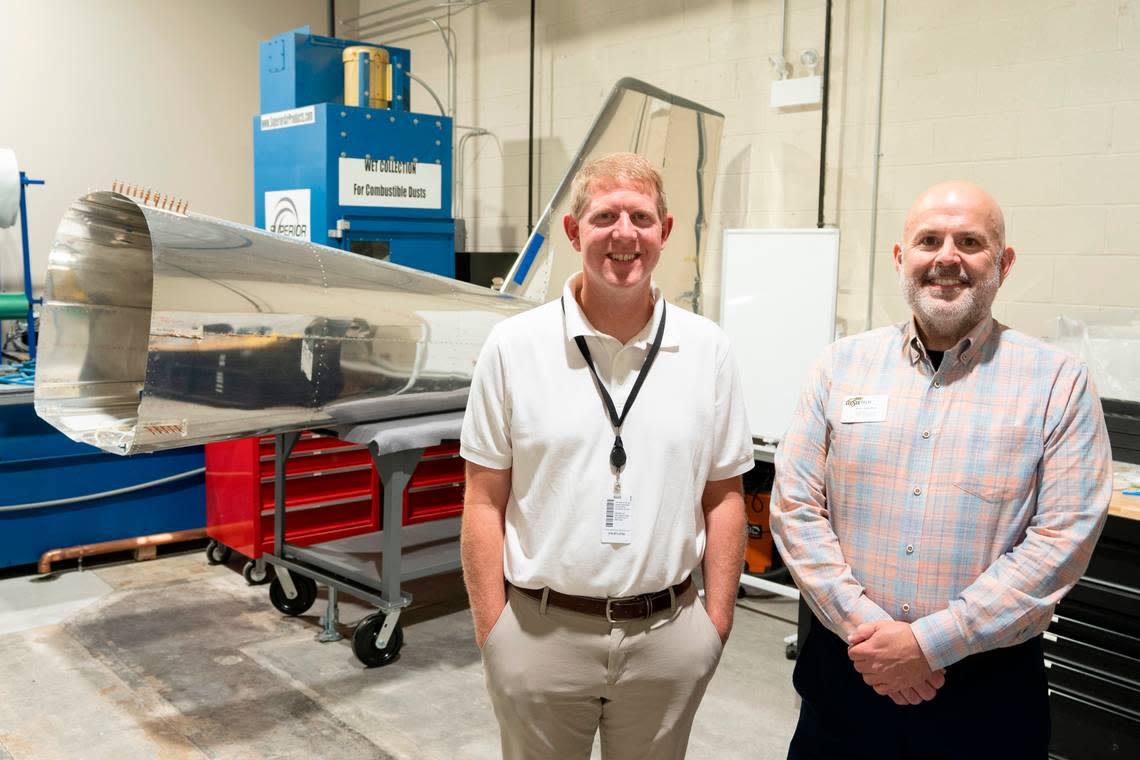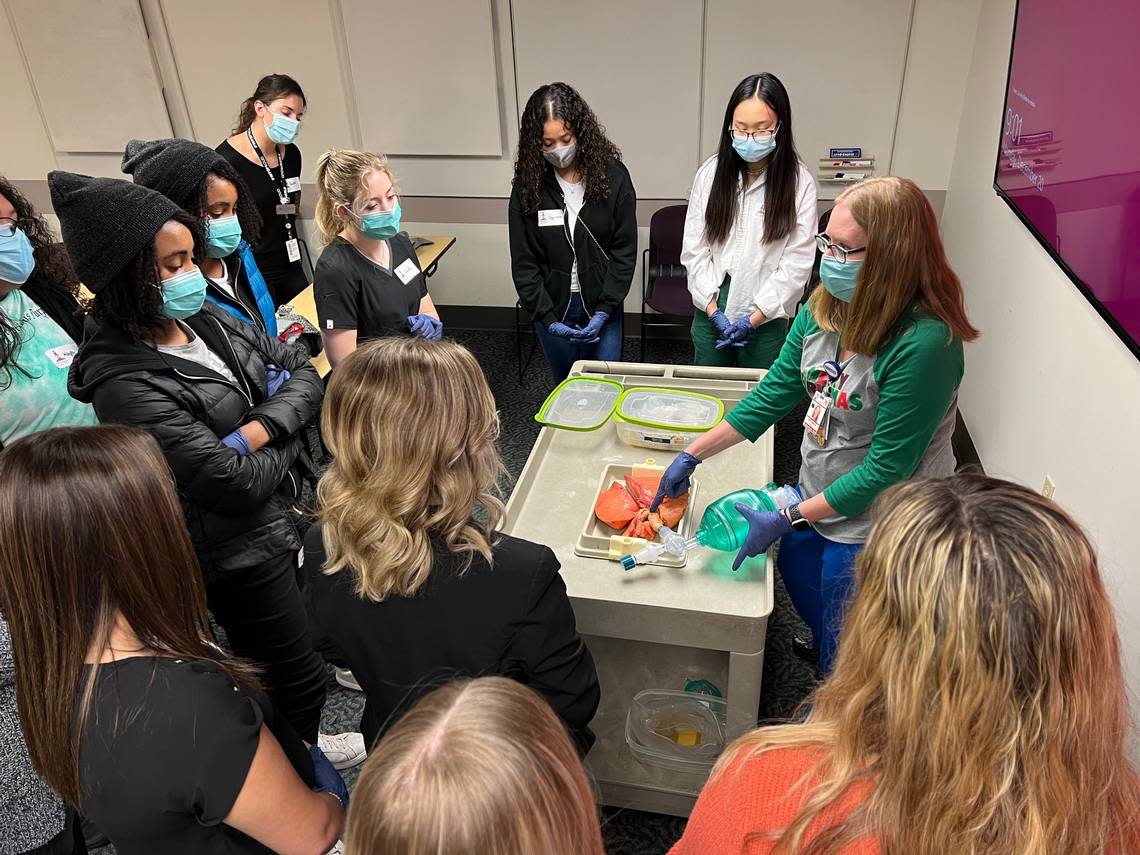School district, WSU Tech and Wesley Medical Center partner to combat job shortages
There may be a shortage of manufacturing and health care workers now, but USD 259 and WSU Tech are creating three new centers to help train high school students and alleviate shortages in the future.
Earlier this year, the Wichita City Council allocated almost $4 million from the American Rescue Plan Act for WSU Tech, which is partnering with the school district to create a Future Ready Center at the former Dillons store next to North High School and two more centers in partnership with the district and Wesley Medical Center.
The one in the former grocery at 13th and Waco will serve the manufacturing and aviation sectors.
“It’s really going to become a hub for advanced manufacturing,” said Kelly Bielefeld, executive director of college and career readiness for Wichita public schools.
The other centers will focus on health care and be located at Wesley’s Medical Arts Tower near Central and Hillside and at WSU South on East Harry near Hillside.
“We’re trying to help high school kids understand if health care is right for them,” said Scott Evans, Wesley’s community engagement manager.
“I’ve been wanting to find a way to get high school students better access to health care opportunities.”
He said it makes sense for a health care organization and higher education to partner.
“They were looking to start something similar as well.”
Bielefeld said the manufacturing center is on the 50-yard line in terms of being almost ready while the health care centers are more like on the 5-yard line.
There have already been classes in small spaces at the former grocery, including sheet metal and composites classes and an airplane build from a kit.
“All of that’s very cool, but that’s kind of just step one,” Bielefeld said.
There will be much more to come this school year, and eventually there will be opportunities for working adults to take classes as well as elementary and middle school students.
“We’ll be able to do more contact and help just build this pipeline,” said Scott Lucas, WSU Tech’s vice president of aviation, manufacturing and institutional effectiveness.
He said the center will offer students an Exploration Place-type understanding of what manufacturing is and what they can do for careers.
The idea is “to build this idea that manufacturing is not a dirty place to work,” Lucas said.
He said it will be a clean environment with cutting-edge equipment.
“There’s all kinds of opportunities.”
Bielefeld said the idea is for them to think, “Ooh, this is cool. I want to do this for a job.”
‘Jobs of the future’
The model behind all three centers is the same. It’s about centralizing access to good facilities and equipment and making it easier for teachers so they can travel to fewer places.
At the manufacturing facility, Bielefeld said, “It’ll look like a high-tech lab,” with anything related to “jobs of the future.”
That includes teacher-led study of automation, robotics, machining, laser cutters, water jets, drones and a whole lot of aviation.
“We’re really trying to support manufacturing . . . across the region,” Bielefeld said.
“It became pretty apparent there’s a big need for the program in Wichita,” Lucas said.
He said it was kind of crazy that “there was never an educational pathway in Kansas for aviation.”
Four years ago, Textron and the school district helped develop an aviation pathway for students through the state Department of Education. Those classes — in assembly and production and also maintenance and automation — will start at the Future Ready Center in August.

Lucas said the grant funding is making the purchase of equipment possible to “really get this program off the ground.”
About $1.75 million of the almost $4 million will go to equipment, marketing dollars, curriculum development dollars and the funding of some faculty positions.
“It provides . . . some courses in some areas that we actually haven’t been teaching in,” Lucas said.
It “really fills the need of where our manufacturers in our region, in our community, are looking for workers right now.”
USD 259 teachers will teach core curriculum and basics, and WSU Tech instructors will handle higher levels of teaching and more specialized training. Students will be eligible for college credits.
Lucas said that previously there has been a focus on jobs such as welding and machining.
“This provides another whole aspect. . . . So it’s helping the entire manufacturing sector.”
He said it helps students with career-ready skills in a lot of new areas.
“We’re providing a complete different model with the Future Ready Center.”
A health care pipeline
Wesley already has been helping high school students learn through job shadowing and virtual training, but Evans said its two Future Ready Centers will create a health care pipeline for students similar to what the manufacturing center will do for that industry and aviation.
“Now, this is going to get them more hands-on experience.”
About $2.1 million of the grant money will go to these two centers, the first of which, at Wesley, should be ready early in the new year.
Students will receive training in phlebotomy, taking EKGs and becoming certified nurse assistants, which usually is for work in long-term care facilities.
In the future, there may be training for patient care technicians, which is the hospital version of a CNA.
“It’s going to give the students the opportunity to rub shoulders with health care professionals,” Evans said.

The hope is to expand the programs to include dental and veterinarian training, too.
“It’s a long-game play to help with the nursing shortage and the health care worker shortage,” Evans said. “Once they graduate, they are able to get a job.”
He said it’s a chance for students to see if health care is a good fit for them.
If the students decide to go further in training after high school and are working at Wesley, Evans said there is a tuition reimbursement program of up to $5,250 a year.
He said it’s all in the hopes of making health care a more desirable career and a more attainable one for people, and it will help Wesley and other medical facilities retain workers.
Evans said where the students start isn’t where they have to end up.
“For a lot of people, that’s a springboard to a nursing career or a medical career in terms of a physician.”
Future potential
Once all the centers are established, there will be more opportunities for college students and working adults to get new training.
“We would like to think about potential community classes or evening classes down the road once we get this up and going,” Lucas said.
With the center at 13th and Waco, he said he’d like to “really focus on the community on the north side of Wichita.”
A lot of manufacturers are in that area, and a lot of potential workers are, too, he said.
Bielefeld said he’d also eventually like to get other students excited about the facility and getting jobs in the area.
“We’d like to bring in younger students.”
In 2018, the district began allowing Project Teacher to use a small amount of space in the building for an office and warehouse.
The group, which distributes classroom supplies to teachers, will continue to be in the space when the Future Ready Center opens.
The building is 43,000 square feet.
“It’s a giant space,” Bielefeld said.
Except for the Project Teacher area, the Future Ready Center will occupy the rest of the building.
“It truly will encompass almost the entire space there,” Lucas said.
He said the center is one of three models that WSU Tech uses for teaching high school students.
Students can attend classes on the WSU Tech campus or take classes at their high schools with college-based curriculum or they can go to someplace such as a Future Ready Center.
“We’ve had a pretty long relationship with USD 259 in providing options for students.”
